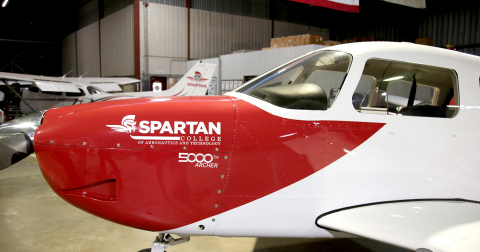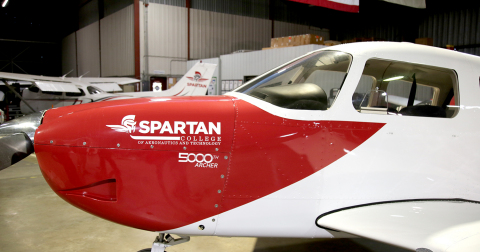TULSA, Okla.--(BUSINESS WIRE)--Officials at Spartan College of Aeronautics and Technology announced today the expansion of its aircraft fleet with the purchase of 32 new Piper Aircrafts to meet the future demand for certified pilots in the United States. Oklahoma state and local officials joined Spartan College and Piper Aircraft leaders for the historic delivery of the 5000th Piper Archer Aircraft at Spartan College’s flight facility at Jones Riverside Airport in Tulsa, Okla.
Founded 92 years ago, Spartan College is one of the Nation’s first technical training schools for pilots and aviation maintenance. Spartan College is located in the following areas: Tulsa, Okla.; Los Angeles; Inland Empire, Calif.; and Denver. Spartan students have come from across the United States and more than 62 countries.
“Since 1928, Spartan has trained and changed the lives of more than 100,000 pilots and mechanics serving in civil and military careers. With the purchase of these aircraft, we are re-committing ourselves to our current and future students, and the aviation industry as a whole,” said Spartan College CEO Rob Polston. “Our strategic plan is to make Tulsa, Los Angeles and Inland Empire, and Denver the most sought-after destinations for flight and mechanic training as well as the single-largest and most-recognized flight school in the United States.”
Based in Vero Beach, Florida, Piper Aircraft was founded 83 years ago and manufactures the Archer Aircraft, the standard plane used for new pilots and flight schools. The Piper Archer first debuted in 1975.
“Piper has achieved a significant aviation milestone today with the delivery of the 5,000th Piper Archer to Spartan College,” said Simon Caldecott, president and chief executive officer for Piper. “As Spartan College of Aeronautics and Technology continues to expand their aviation programs, Piper Aircraft is proud to be part of their comprehensive aviation program. As a longstanding pilot training provider, they continue to demonstrate their commitment to excellence and their students by providing multiple aviation programs and opportunities for their students. We look forward to their continued success and to providing more Piper trainers in support of their commitment to aviation education.”
Prior to the COVID-19 pandemic, the U.S. was already facing a shortage of pilots due to national and global demand. According to the 2020 Boeing Market Outlook (BMO) released in October, the company predicts that near and long-term market adjustments will still require replacement of “tens of thousands of pilots and trained technicians due to retirement age. Over the next decade, educational outreach and career pathway programs will be essential to inspiring and recruiting the next generation.”
“As the world economies bounce back from the temporary set-back of COVID-19, which they inevitably will, air travel will resume, just as it has after every major external shock from the energy crisis, to the financial crisis and SARS,” said Polston. “Despite what the technology giants hope, there is no substitution for the business and personal connections that come with flying from one destination to another.”
Spartan College’s fleet growth and its ongoing capital investment is key to providing the aerospace and aviation industry with the pipeline of skilled, certified employees needed to maintain the industries employment base.
Spartan College is proactively addressing the upcoming pilot shortage by offering students options to train for pilot certification. Training to become a pilot at Spartan College will give you skills and experience necessary to earn multiple Federal Aviation Administration (FAA) part 141 pilot certifications, in just 17 months. Due to the pandemic, Spartan College is working on reinventing its training programs into a hybrid model with online options for several of its programs, including aviation maintenance technicians.
“With the addition of the Piper Archers, Spartan students will be trained with industry-leading technology such as electronic flight bags and the latest Garmin G1000 avionics system,” said Beau Schrader, Spartan College’s vice president of flight operations. “By teaching Spartan students on features like the flight management system, weather, traffic, terrain, and autopilot, the students will receive professional environment experiences in a training environment to better prepare and equip them with the experiences to succeed in the aviation industry.”
“If you or someone you know are interested in learning more about Spartan’s Aviation Flight program visit spartan.edu/fly,” Polston said.
About Spartan College of Aeronautics and Technology
Since 1928, Spartan College of Aeronautics and Technology has provided training to more than 100,000 pilots and technicians from throughout the United States, and more than 60 countries. Spartan College, with four locations: Tulsa, OK, Broomfield, CO, Inglewood, CA, and Riverside, CA, offers programs in the areas of Aviation Flight, Aviation Maintenance Technology (Airframe and Powerplant), Aviation Electronics Technology, Nondestructive Testing Technology, and Quality Control Management, as well as a Bachelor of Science degree in Technology Management. (Programs vary by location). Tulsa and Broomfield locations are accredited by the Accrediting Commission of Career Schools and Colleges (ACCSC). Both California locations are accredited by the Council on Occupational Education (COE). Riverside is a branch of the Inglewood Campus. Spartan Education Group, LLC, is the parent company of Spartan College of Aeronautics and Technology.




